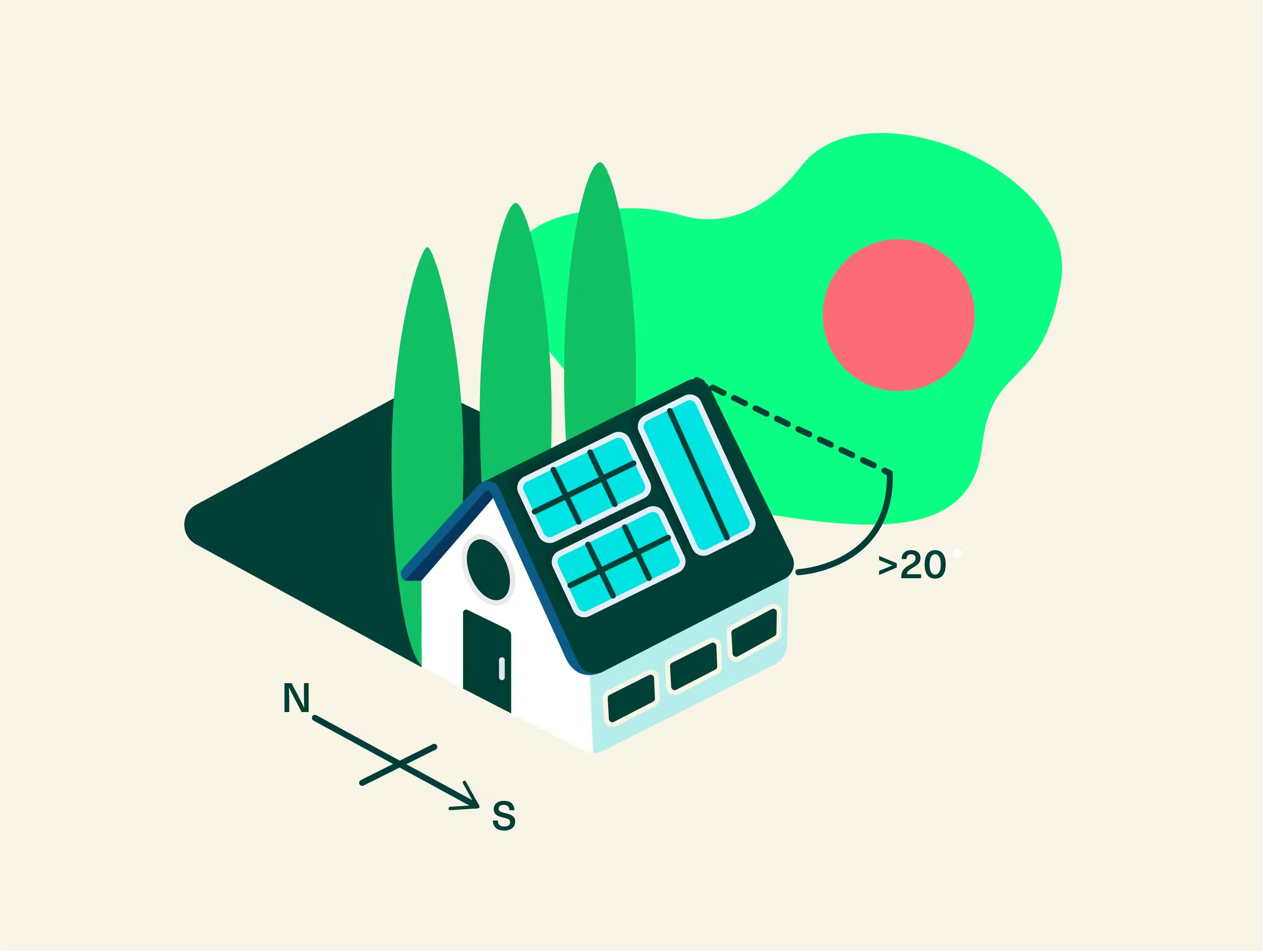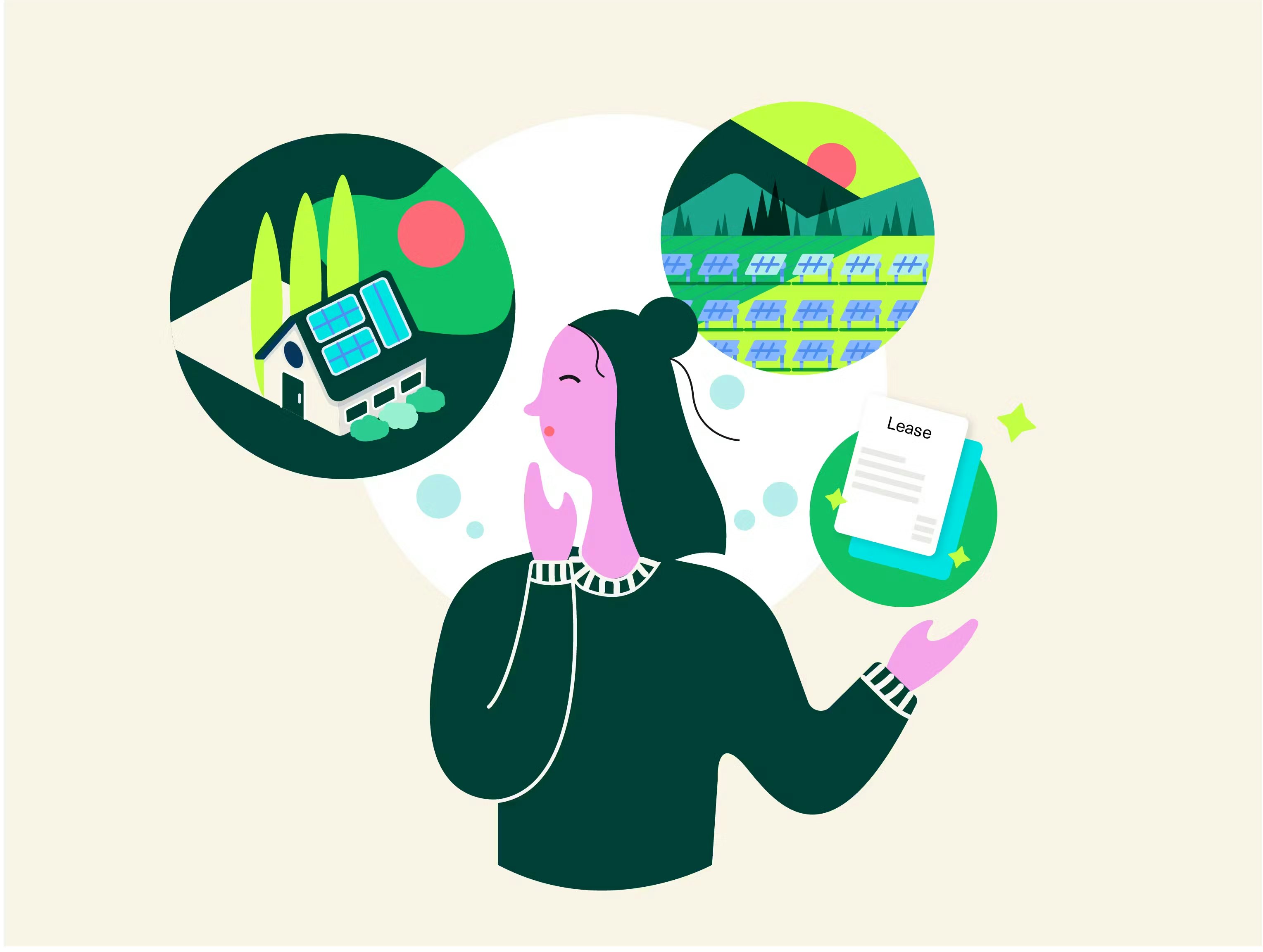How to find the best home solar system for you

So you’ve decided that you want to go solar at home — awesome! Going solar benefits both you and the environment. You can save money on your power bills, and the clean electricity that the solar panels generate goes into your local power supply, reducing the need for electricity from fossil fuels. Fewer fossil fuels means less pollution from greenhouse gases.
You have two basic options for going solar: installing a home solar system on your property or joining a community solar program. Each has its own considerations, including what your living situation is like.
Below, we break down your options and what you should think about before you make your decision.
Option 1: Solar panels for your home
When most people think about going solar, they probably think about installing solar panels on the roof of their home. If you decide to go this route, you’ll need to consider factors such as the right equipment, the best installer, the warranty, the upfront cost, the size of the solar system, and whether you want to buy or lease the solar system.
Buying a home solar system
Homeowners who install solar panels can save big on their energy bills and increase the value of their homes. One study from the Lawrence Berkeley National Laboratory found that installing solar panels increased home values by an average of $15,000.
Getting a solar system to meet all of your energy usage may not be realistic — the average US home uses more than 10,600 kWh of electricity in a year. A solar photovoltaic (PV) system large enough to generate that much energy could be expensive and take up more space than you have available.
To find out how many square feet of solar panels to install and how much electricity you can expect the panels to generate, talk to a solar installer in your local area. The number of solar panels and how much electricity they generate will vary based on the panels’ efficiency. Efficiency is the measurement of how much of the sun’s energy can be converted into usable electricity. Average efficiencies typically range from 15-18%.
Climate plays a role in solar panel efficiency. If you live somewhere with less daily sun exposure (e.g., in a northern state), you’ll probably want a more efficient solar panel system. The positioning of your roof is another consideration. Roofs that face south offer the greatest window for productivity because they receive the longest sun exposure. If your roof faces a different direction or the southern-facing part of your roof is covered by trees or located in a shaded area, you can place your solar panels elsewhere. Just know that their efficiency will not be as high.

Most solar energy systems last 25-30 years and pay for themselves within 7-20 years, depending on factors including geography, average electricity use, and estimated electricity generation from the panels. Homeowners can take advantage of incentives such as tax credits and rebates to help lower the upfront cost of installing solar panels.
Leasing a home solar system
Some homeowners install solar energy systems on their property without paying for the equipment. A third party (usually a solar company) owns the equipment, and the homeowner pays to lease it.
With a solar lease, you can limit your upfront investment and avoid the responsibility for maintaining and repairing the panels, all while still reducing your power bills. Any unused electricity that your system generates will be sold back to your utility company through a net-metering arrangement.
Hosting a solar array
If you own land in a sunny area, another option you could consider is hosting a solar system for a local energy company. The solar company would do all of the legwork and installation — getting the permit, determining the size and design of the solar array, purchasing and installing the equipment, etc. — at little or no cost to you. You would buy the power back from the solar company at a price set in your power purchase agreement (PPA). In most cases, you can negotiate a price lower than the standard rate charged for other consumers.
Option 2: Community solar
Rooftop solar panels are a great way to increase clean energy and save money in the long run. But they’re not for everyone. First, you need to own your home. Then you need to be able to afford the upfront investment, or be approved for financing, to install the panels. Finally, you need to have a roof that meets all the requirements for solar panels (e.g., not too old, not too steep) and get all the proper permits. Rooftop solar is only an option for about one-third of US households.
Community solar solves the accessibility problems of rooftop solar by allowing homeowners and renters to support solar energy and save on their power bills — without installing their own solar panels. Instead, you join a local solar farm. Your neighbors and area businesses can join, too. These solar farms are often built on unused land, but they can also be in people’s backyards or on community buildings.

When you join a solar farm, you’re subscribing to a portion of the total energy that farm produces. Your portion is based on how much energy you use in a typical month. As your solar farm generates electricity, you earn credits on your monthly bill from the utility. Finally, Arcadia directs part of your total power bill to the solar farm, to keep it in business. Your credits are always larger than what you pay the solar farm, so you’re guaranteed to save money on your bill.
Because the solar panels are housed elsewhere, anyone who pays a power bill can join a community solar farm. It’s an easy, direct way to help clean up your local power supply.
Case studies
Which option is right for you? Let’s look at a few examples to help you decide.
Anna and Michael own a home in sunny California
Anna and Michael own a three-bedroom home in Glendale, California. With plenty of California sunshine available, installing their own rooftop solar panels makes a lot of sense for this couple. They can make all their own decisions and reap all the rewards, which include reducing or even eliminating their electricity bills and receiving tax credits and rebates. Of course, their investment benefits the rest of us, too, with a cleaner power grid and less dependency on fossil fuels.
Sarah rents a small apartment in Brooklyn
Sarah is environmentally conscious, but she doesn’t own her home, nor does she have a roof or yard where she can install solar panels. After researching her options, she finds a local community solar project. By joining, she’s investing in her local community and saving on her electric bill. And since the solar energy provider maintains and repairs the solar panels, Sarah doesn’t have to learn about installing or maintaining panels.
Aaliyah shares her house in Connecticut
Aaliyah bought a house in Connecticut, and Paige and Nika moved in with her. They want to use solar power, but they want to limit their joint investments, and buying their own solar system just isn’t practical right now. Instead, they choose a solar lease. A local power company places a solar energy system on Aaliyah’s house, and the three roommates pay a flat monthly fee to lease that equipment and get their solar energy. They’re thrilled to see the savings on their electric bill!
Chris and Henri have a ranch on family land in Colorado
This couple owns acres of sunny space on which they can host a solar energy system for their local power company, so they opt for a PPA. The power company chooses panels designed with extra durability to withstand Colorado’s high winds and heavy snows. Chris and Henri buy the solar power from the power company at a reduced price and sell any unused electricity back.

Sign up for solar savings
Sign up

